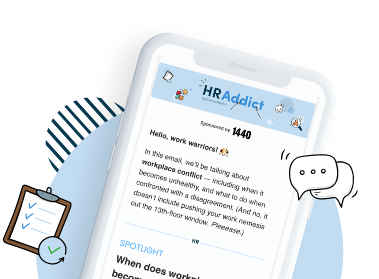No reasonable employer can expect their employees to perform at their best 100% of the time. Employees, after all, are humans — not machines — and are bound to make the occasional mistake or hit a hiccup here or there. Indeed, the occasional slump in performance is perfectly normal and no cause for alarm.
But when employee disinterest and underperformance is more of a permanent rather than a momentary issue, either on an individual or team-wide basis, then you’ll undeniably need to take appropriate action.
In this guide, we’ll discuss 10 effective steps for managing poor performance, along with actionable tips, examples as well as signs to look out for.
TABLE OF CONTENTS
What is poor work performance?
By definition, poor work performance refers to an employee’s inability to fulfill the responsibilities and expectations of their role based on set standards. It doesn’t just relate to tasks and assignments, though — it can also entail poor teamwork or ignorance of company rules.
That said, “poor work performance” itself is a relative term — indeed, what one company or industry may deem as underperformance may be perfectly acceptable for another. It also depends on organizational standards as well as individual expectations.
For example, let’s say a sales employee closes 10 deals in a month. This might be considered poor performance in one company where the monthly target is 15 deals, but another company where the monthly target is 5 deals would consider this nothing short of exceptional.
The causes of poor work performance
Poor work performance has several causes, both inside and outside the workplace:
Employee-related factors
- A lack of required skills and knowledge to perform tasks effectively
- A lack of job satisfaction or career growth opportunities
- Poor time management skills
- Health or personal issues
- Behavioral and attitude problems
Organizational factors
- A toxic work environment or otherwise poor culture
- A lack of clarity regarding roles, responsibilities, expectations and standards
- Limited resources, like tools and technology, to effectively complete tasks
- Insufficient onboarding, training or professional development opportunities
- Overly critical, aggressive, demoralizing or otherwise ineffective leadership
External factors
- Market or industry changes that make skills or roles obsolete
- Job insecurity caused by economic challenges like budget cuts and downsizing
- Personal life events like family emergencies and illnesses
The effects of poor work performance
An employee’s underperformance has a wider impact on the company, including:
Reduced team productivity
When one employee isn’t pulling their weight, they risk creating issues for their team and the company at large. Indeed, when they delay their contributions to a task or project, the rest of the team’s productivity suffers, slowing down overall workflows. This then affects team and organizational efficiency and output.
Lower morale
As the rest of the team picks up the slack to compensate for an underperforming colleague, they’ll slowly but surely begin to feel overburdened and frustrated. Inevitably, this will lead to tensions and conflicts, and finally reach to decreased morale, especially if the underperforming employee keeps getting away with things.
Client dissatisfaction
The team and company won’t be the only ones to feel the impact of an underperforming employee — clients will, too. Indeed, subpar work can unavoidably lead to mistakes or unmet expectations. Whether these errors are big or small, their constancy will prompt clients to take their business elsewhere—and tarnish your company’s reputation along the way.
Increased costs
Underperforming employees also pose a financial drain on employers. Indeed, errors, inefficiencies in processes and missed deadlines lead to increased and unnecessary costs. For example, a machine operator consistently producing defective parts means that additional resources need to be acquired to rectify the issue, which can then lead to financial losses and generally reduce overall profitability.
Higher turnover
Poor performance, especially when left unchecked, can make things difficult for the company in their efforts to retain top talent. Indeed, high-performing employees will eventually grow tired and frustrated of having to regularly step in for an underperforming coworker, and they will see no option but to jump ship.
Signs of underperformance to look out for
So, what does poor employee performance look like? Here are the main signs you need to look out for:
- They display a lack of motivation or energy to complete tasks
- They regularly take longer than usual, or stay late, to deliver average work
- They become increasingly negative (which includes an unwillingness to help coworkers and a tendency to bring up problems but no solutions)
- They repeatedly miss deadlines, targets or objectives
- They make frequent mistakes and have to do a lot of rework to rectify those mistakes
- Their overall work quality declines and their output levels deteriorate
- They have a high absence rate or take longer periods of absence
- The company regularly receives complaints from unhappy customers
Steps for managing poor work performance
Below are 10 effective steps you can take to address and combat poor performance in the workplace:
Step 1: Identify performance issues and concerns
First things first, take the time to monitor and document specific instances of underperformance — like missed deadlines, a lack of productivity or poor-quality work — that repeat over time. (Remember: one-offs are usually no cause for alarm.)
That said, make sure that you understand the work and expected performance outcomes for each employee before looking for issues that may not even exist. It’s also a good idea to consider feedback from supervisors, customers and coworkers, but don’t rely on these only — make your own observations as well.
Step 2: Analyze the root cause
Once you’ve identified any specific performance issues, you need to take the time to understand why they’re occurring in the first place. In other words: put your detective cap on!
Whether it’s due to unclear expectations, personal challenges or skill gaps, investigating the potential reasons for an employee’s poor work performance will help you better approach the employee in question and address the problem head-on.
Step 3: Set up a private meeting
After you complete your investigation and you’ve not only identified an issue regarding the employee’s performance but also determined the cause, schedule a confidential meeting with them to address and discuss your concerns.
Do make sure to approach the meeting with empathy, respect and objectivity, and — importantly — to focus on understanding their perspective instead of playing the blame game. This would only do more harm than good.
Step 4: Clarify job expectations
During the meeting, it’s important to clarify job expectations as much as it is to understand the underperforming employee’s perspective.
This involves two things. One, clearly outlining their responsibilities, performance standards and how exactly their role contributes to the organization’s overall goals. And two, making sure they understand what it is that’s expected of them.
Step 5: Provide constructive feedback
During your discussion with the underperforming employee, it’s crucial that you provide them with objective and constructive feedback.
This means using specific examples to illustrate their underperformance while emphasizing how it impacts the bigger picture, as well as their team and the business itself. It also means being respectful and collaborative in your approach and delivery — this will avoid the employee becoming defensive, trying to shift the blame elsewhere or, worse, becoming aggressive or violent.
Step 6: Develop a performance improvement plan
Together with the employee, come up with an action plan on how to take things from there. This essentially involves developing a performance improvement plan, a formal document that outlines existing performance deficiencies and gaps, sets expectations and lists individual steps for improvement, along with measurable goals and deadlines.
It’s also a good idea to include resources, training and additional support in the PIP, and anything else that will help them improve. This not only looks out for the company’s success, but it also assures the employee that you care about their own personal and professional success.
Step 7: Offer coaching and support
Throughout the process, it’s imperative that the underperforming employee feels supported, and that they’re not being apprehended, as this could further deteriorate their performance.
As mentioned, you should provide appropriate training to help them develop any necessary skills, meet the expectations that have been set, and generally improve their performance. Meanwhile, providing regular feedback and even offering mentoring will also be useful.
Step 8: Monitor progress regularly
As part of the PIP you developed, you should conduct regular check-ins with the employee, whether it’s on a weekly or biweekly basis, to evaluate the progress they’ve made, if any.
During these check-ins, make it a point to offer constructive input, address any setbacks diplomatically, acknowledge improvements and, importantly, celebrate successes — big or small, which all be done in real time. Indeed, the more supported they feel, the likelier their performance will improve and be maintained.
Step 9: Assess final outcomes
At the end of the PIP period, be sure to carefully and thoroughly review the employee’s overall progress, while measuring any metrics you’ve put in place and seeking feedback from the employee’s direct supervisor and colleagues.
Once you’ve completed your review, you’ll need to decide what comes next. Have they met expectations, and you can put the issue to bed? Do they require additional support? Or is further action needed?
Step 10: Document and take necessary action
Throughout the entire process, it’s important to maintain detailed records — this includes meetings you had with the employee, feedback that you provided, and action plans you put in place.
If, after everything, the employee’s performance doesn’t improve, or worsens altogether, then you’ll need to take disciplinary action according to company policies and procedures. If you have no choice but to terminate the employee, make sure to consult the legal department and comply with government, state or federal labor laws.
Key takeaways
Here’s a rundown of what we discussed in this guide:
- Poor work performance constitutes an employee’s inability or refusal to meet the expected standards of the role they’re employed for.
- There are many causes of poor performance, covering a variety of employee-related, organizational and even external factors.
- If left unchecked, it can pose serious threats to team productivity and morale, as well as lead to client dissatisfaction, increased operational costs and higher turnover.
- Tell-tale signs of poor work performance include (among other things) higher absence rates, increased negativity, missed deadlines and lower levels of output.
- Managing poor performance begins with identifying potential issues and analyzing the root cause, and requires providing constructive feedback and developing an improvement plan.
Got a question, or want to share your own strategies for managing poor work performance? Let us know in the comments section below.
This article is a complete update of an earlier version originally published in 2018.

